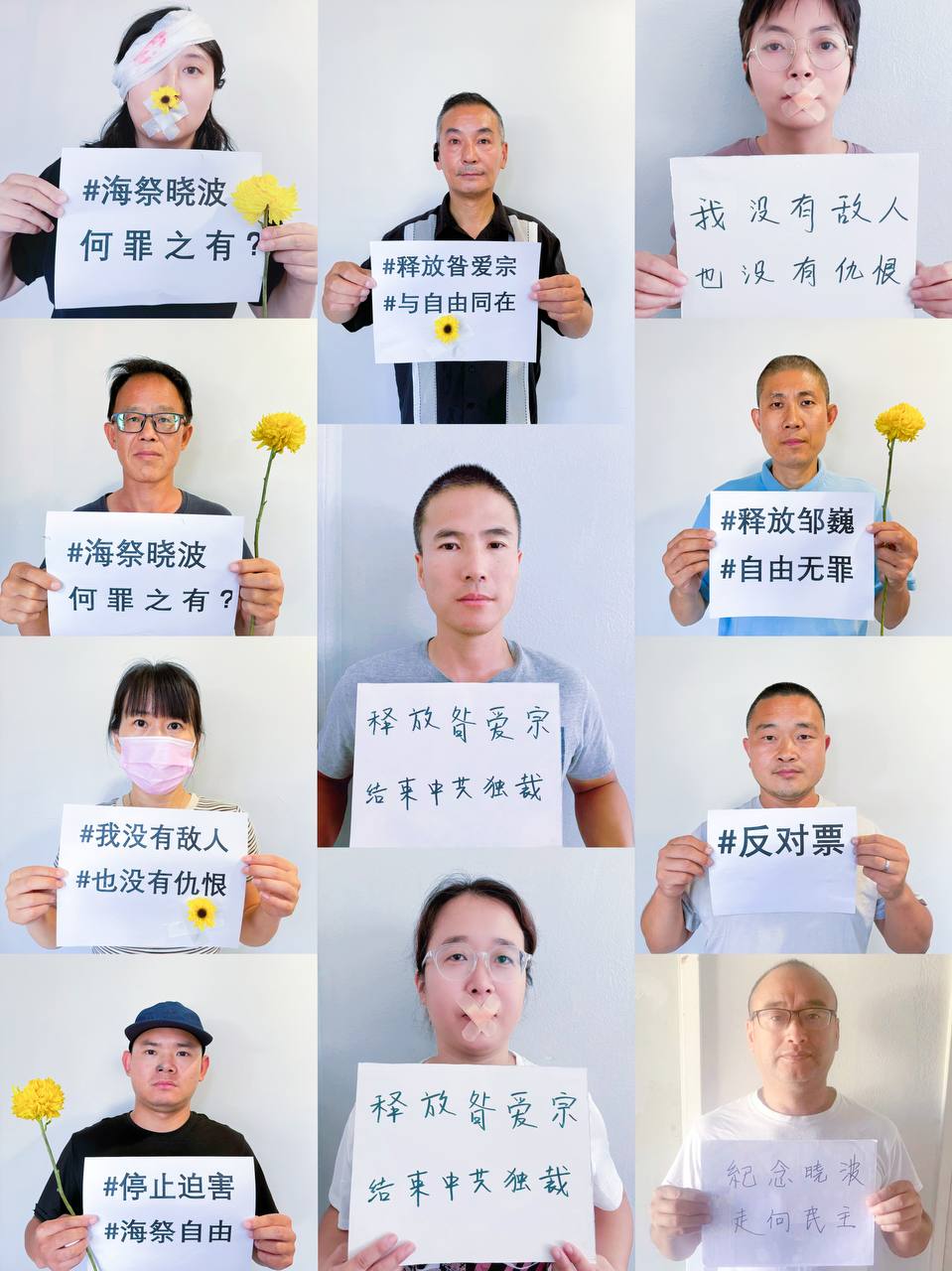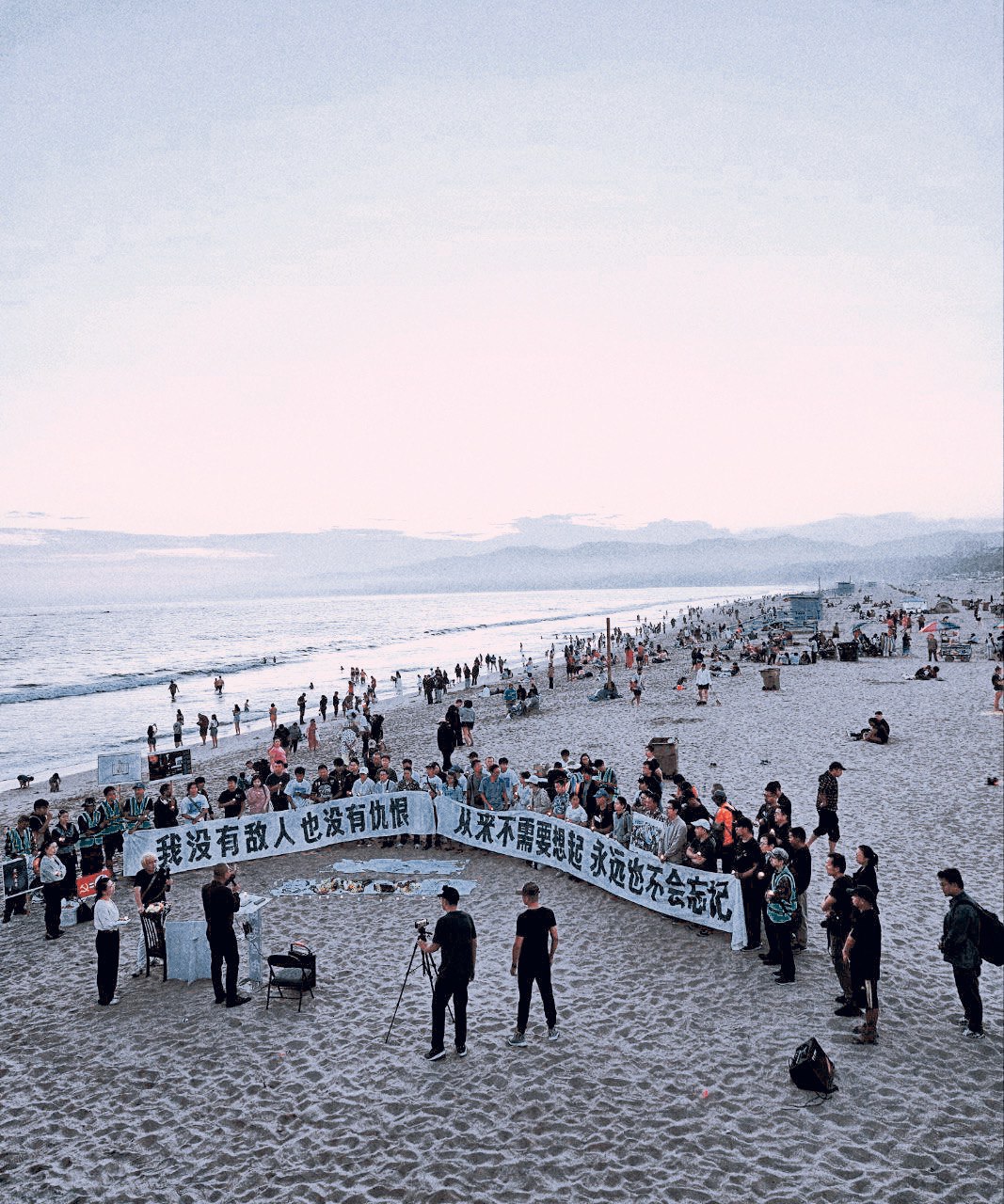
杭州的秋天,总是会有雾气。雾气从钱塘江里生出,沿着河堤的石缝爬上来,把街灯和行人都变得模糊。这样的季节里,有人走进法院,成为被告。那个人叫昝爱宗。

(被捕前的昝爱宗(中)与邹巍(右)在朱虞夫(左)家)
在中国新闻的字眼里永远不会出现他的名字,他的名字被放进了“涉嫌寻衅滋事”这一栏里。这个词语已经太熟悉了,它像是一个永远张着口的黑色袋子,随时可以把人丢进去。昝爱宗只是去海边祭奠一位逝者,却因此失去了自由。
我想起刘晓波。他在囚禁中死去。他的名字本来属于书籍和奖章,如今却被中国政府刻意遗忘。昝爱宗和他的朋友们不愿意忘记,于是他们去了海边。他们面朝大海,把花瓣撒进浪潮里。海水吞下花瓣,也吞下他们的沉默和祈祷。就在这一刻,纪念变成了罪行。
昝爱宗出生在安徽的平原,1969 年的秋天。那个年代的中国,饥饿与贫穷像影子一样笼罩着乡村。他走出来,成了写字的人。他写散文、写评论、写那些不愿被湮没的故事。他是基督徒,也是独立作家。他加入了独立中文笔会,和那些相信文字自由的人们站在一起。
他常常在边缘上行走。警方会跟踪他,国保会找他谈话。二十大的时候,他甚至被带去“旅游”,所谓的旅游,其实是监视与隔离。他明白这一切,也从未装作不明白。他只是继续写,继续说,继续活成一个清醒的人。
2024 年 7 月 13 日,海宁的潮水翻涌。昝爱宗与几位朋友来到钱塘江入海口。那天的天空并不晴朗,海风带着咸涩的味道。他们没有喧哗,只是点燃蜡烛,撒下花瓣,念出一个名字——刘晓波。
这是一场安静的仪式。安静到除了风声和浪声,没有第三种声音。可就是这样安静的纪念,却被视为危险的行动。午夜时分,警车划破黑暗,把他们带走。
我想起一句话:人的命就是一直忍受。可有些人不只是忍受,他们还在忍受里保持记忆。
2025 年 9 月15日的杭州,法院的门口一定也有雾气。昝爱宗会走进去,坐在被告席上。公诉书上的字冷冰冰,写着“寻衅滋事”。
法官一定会问他:你是否认罪?而他大概会抬起头,用微微沙哑的声音说:我只是去海边祭奠一个人。
这样的回答,法律无法容纳。
也许在庭下坐着的人,眼神复杂。朋友们可能被阻拦在法院之外,甚至无法靠近。空气里充满一种荒诞:在别的国家,人们可以为逝去的诗人、作家、思想者竖立雕像;在这里,去海边献花却成了罪行。
昝爱宗并非英雄。他只是一个普通的写作者,一个信仰者,一个不愿丢掉记忆的人。可是正因为普通,所以他的遭遇更让人心酸。
在当下中共的统治里,遗忘是最廉价的事情。每一天都有新的新闻、新的热点,把昨日掩盖。昝爱宗却拒绝遗忘。他知道刘晓波的名字不能消失,哪怕只是在海边低声呼唤一次。
这种记忆的坚持,像是一种顽固的信仰。它没有枪支,没有队伍,没有口号,却比任何口号都要锋利。
海浪一遍遍涌来,把岸边的脚印抹去,也把花瓣卷走。可海不会忘记。海是巨大的记忆体,它保存着人类的欢呼与哭泣,保存着那些无法被官方档案写下的秘密。
昝爱宗把自己的良知托付给海。海回应了他,却无法保护他。于是他走进了看守所,走进了法院。
我总觉得,这个故事带着浓重的余华式的荒诞感:一个人去海边撒花,被告知这是“寻衅滋事”;一位作家因为祭奠另一位作家,而成了被告。现实本身,已经荒诞到比小说更难以置信。
声援昝爱宗,其实也是声援我们自己。
2024年7月13日,我也一手策划了海祭刘晓波的活动,只不过我在圣莫妮卡海,他们在钱塘江入海口,我们平安的回了家,他们关进了专制的牢笼。
我们要问:今天他因为海祭而受审,明天还会是谁?如果连纪念的自由都被剥夺,那么我们将生活在怎样的沉默里?
他的遭遇提醒我们,记忆需要守护,良知需要有人承担。或许我们每一个人都无法像他那样走到海边,但至少我们可以记住他的名字,记住他为什么被审判。
杭州的秋天,雾气依旧会从江面升起。法院的审判终将结束,判决书会落在纸上。可我相信,当年钱塘江的海风,已经把昝爱宗的花瓣带到更远的地方。
那里有刘晓波,也有无数逝去的人。他们在海的另一边,看见一个中年作家俯下身,把花瓣投进浪潮。
而我们,也要记得。
(照片为2024年7月13日作者策划的圣莫妮卡海滩祭奠刘晓波逝世7周年活动现场)
The echo of the sea – written on the day of the trial of Zan Aizong
Author: Zhang Zhijun
Translator: Cheng Ming

There is always fog in Hangzhou in autumn. The fog came from the Qiantang River and climbed up along the stone cracks of the river embankment, blurring the streetlights and pedestrians. In such a season, someone walks into the court and becomes a defendant. That man’s name is Zan Aizong.

(Before his arrest, Zan Aizong (middle) and Zou Wei (right) were at Zhu Yufu’s (left) house)
His name will never appear in the words of Chinese news. His name was put in the column of “suspected of causing trouble”. This word is too familiar. It is like a black bag that always opens its mouth and can throw people into it at any time. Zan Aizong only went to the beach to pay tribute to a deceased person, but he lost his freedom because of it.
I think of Liu Xiaobo. He died in prison. His name originally belonged to books and medals, but now it is deliberately forgotten by the Chinese government. Zan Aizong and his friends didn’t want to forget, so they went to the seaside. They faced the sea and scattered the petals into the waves. The sea water swallowed the petals and also swallowed their silence and prayers. At this moment, the memorial became a crime.
Zan Aizong was born in the plains of Anhui Province in the autumn of 1969. In China at that time, hunger and poverty covered the countryside like a shadow. He came out and became a writer. He writes essays, comments, and stories that he doesn’t want to be annihilated. He is a Christian and an independent writer. He joined the Independent Chinese Pen Association and stood with those who believed in freedom of writing.
He often walks on the edge. The police will follow him, and the national security will talk to him. During the 20th National Congress, he was even taken to “travel”. The so-called travel was actually surveillance and isolation. He understood all this and never pretended not to understand. He just continued to write, continued to speak, and continued to live as a sober person.
On July 13, 2024, the tide of Haining surged. Zan Aizong came to the mouth of the Qiantang River with several friends. The sky was not clear that day, and the sea breeze tasted salty. They didn’t make a fuss. They just lit candles, scattered petals, and recited a name – Liu Xiaobo.
This is a quiet ceremony. It was so quiet that there was no third sound except for the sound of wind and waves. But such a quiet commemoration is regarded as a dangerous act. At midnight, the police car cut through the darkness and took them away.
I remember a sentence: human life is to endure all the time. But some people don’t just endure it, they also keep their memories in it.
In Hangzhou on September 15, 2025, there must be fog at the gate of the court. Zan Aizong walked in and sat on the dock. The words on the indictment were cold, and it was written as “seeking trouble”.
The judge will definitely ask him: Do you plead guilty? And he probably raised his head and said in a slightly hoarse voice: I just went to the beach to pay tribute to someone.
The law can’t accept such an answer.
Maybe the person sitting under the court has complicated eyes. Friends may be blocked outside the court and can’t even get close. The air is full of absurdity: in other countries, people can erect statues for deceased poets, writers and thinkers; here, it is a crime to go to the beach to offer flowers.
Zan Aizong is not a hero. He is just an ordinary writer, a believer, and a person who is unwilling to lose his memory. But because of the ordinary, what happened to him was even more heartbreaking.
Under the current rule of the Communist Party of China, forgetting is the cheapest thing. There are new news and hot spots every day, covering up yesterday. Zsn Aizong refused to forget. He knew that Liu Xiaobo’s name could not disappear, even if it was just called out in a low voice by the sea.
The persistence of this memory is like a stubborn belief. It has no guns, no team, no slogan, but it is sharper than any slogan.
The waves surged again and again, erasing the footprints on the shore and the petals away. But the sea will not forget. The sea is a huge memory, which preserves the cheers and cries of human beings, and the secrets that cannot be written down in official files.
Zan Aizong entrusted his conscience to the sea. Hai responded to him, but he couldn’t protect him. So, he walked into the detention center and the court.
I always feel that this story has a strong sense of absurdity of Yuhua style: a man went to the beach to scatter flowers and was told that it was “making trouble”; a writer became a defendant because he paid tribute to another writer. Reality itself is more absurd than the novel.
In fact, solidarity with the Aizong is also solidarity with us.
On July 13, 2024, I also planned the activity of worshipping Liu Xiaobo in the sea, but I was in the Santa Monica Sea. They entered the sea of the Qiantang River. We returned home safely, and they were locked up in an autocratic cage.
We want to ask: He was tried today because of the sea sacrifice. Who else will he be tomorrow? If even the freedom of commemoration is deprived, what kind of silence will we live in?
His experience reminds us that memories need to be guarded, and consciences need to be borne by someone. Maybe each of us can’t walk to the beach like him, but at least we can remember his name and why he was tried.
In autumn in Hangzhou, the fog will still rise from the river. The trial in the court will eventually end, and the verdict will be on paper. But I believe that the sea breeze of the Qiantang River in those years has brought the petals of Zan Aizong to a further place.
There is Liu Xiaobo there, and there are countless people who have passed away. On the other side of the sea, they saw a middle-aged writer bending down and throwing petals into the wave.
And we should also remember.

(The photo is the scene of the Santa Monica Beach memorial service to the 7th anniversary of Liu Xiaobo’s death planned by the author on July 13, 2024)



践行者——我的民主之路(二)朱虞夫-rId4-1267X864.jpeg?w=218&resize=218,150&ssl=1)
-rId6-800X460.jpeg?w=218&resize=218,150&ssl=1)



声援邹巍——言论无罪,释放良心犯-rId6-1280X960.png?w=100&resize=100,70&ssl=1)